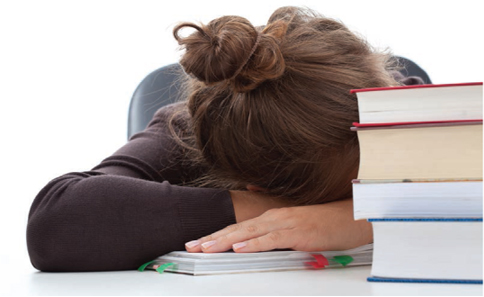
Ah yes, sleep. I love sleep. You love sleep. Who doesn’t love sleep? Snoozing is not only an enjoyable thing to do, but it’s also a time for your body and mind to heal and restore your energy after a busy day. Getting enough sleep every night (yes, naps count too) has been proven to:
The importance of sleep, especially napping, is pretty much ignored in our hectic, technology-obsessed world. We are so consumed with busy schedules, high-tech gadgets and constant, in-your-face entertainment that we tend to forget about rest. I know I’ve felt guilty in the past for napping—feeling as if I’m being irresponsible, lazy, or wasting my time, but this couldn’t be further from the truth. When you feel tired, there is nothing more important than getting some rest. That’s right, not even homework, a big final exam, or your friends’ buzzing text messages should have a higher priority than resting and recharging. If you try to “push through” those times when you’re tired, you not only think less effectively, but you also affect your health in many ways.

Ten thousand years ago, your ancestors were on a schedule with the sun. They woke up naturally and full of energy, right around sunrise. After the sun set, life slowed down big time. Have you ever been camping? There’s not a whole heck of a lot to do after it gets dark. Maybe you tell a few ghost stories by the campfire, then pretty soon someone yawns and everyone passes out.
What this means is that most everything you do after the sun goes down isn’t Primal, especially when what you’re doing has a screen that emits light. Can you think of anything that qualifies? How about a TV, computer, or cell phone? Now, using digital distractions isn’t Primal during the day either, but engaging with super bright screens at night does way more damage. Your body simply is not accustomed to artificial light sources after the sun sets; expose yourself to these bright lights, and you can seriously mess up your health.
Ok, I know you’re scratching your head wondering how in the world something like watching TV at night can be harmful to your health, so let me explain. For starters, when you’re exposed to the stimulation of a bright screen at night, it keeps you awake longer than you’re evolutionarily designed to be. I don’t mean just the time spent on the couch watching your favorite reality show; I’m including the time it takes to decompress after the TV is turned off. The glow from that flat screen actually suppresses your body’s production of melatonin, the chemical that helps you sleep. Not only that, but while your melatonin is dwindling, your cortisol (the stress hormone that makes you crave sugar and store fat) is skyrocketing. Ever wonder why you get the late night munchies while you’re crashed out on the couch? Well, now you know why.
When you were a kid, your circadian rhythm, or internal clock, probably sent signals to your brain that you were ready for bed around 8 or 9 pm. Sound about right? Well, once you hit your teen years, this clock goes through a bit of a reset. Melatonin actually starts to release later at night in the brain of a teen than it does in that of an adult or little kid. Like you needed more reasons to cut out the glowing stimuli of TV, computers, tablets, and cell phones!
And how about the cruel timing this circadian rhythm reboot has on your life…right when you have to deal with early school hours, an overload of homework and tests, sports obligations, maybe you just got a part-time job…and let’s not forget your ever growing social life. How are you supposed to take care of all your responsibilities and get enough hours of sleep each night?
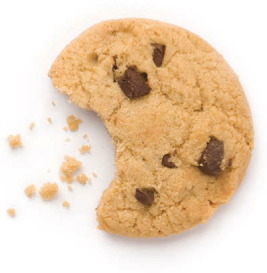
For most of us, “enough sleep” means between eight and a half and nine hours of sleep each night. How do you fit into this average? Most teens only catch between six and seven hours of zzzs per night. Does that sound a little more like your sleep schedule?
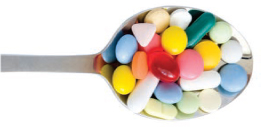
Some of your friends or other people at school might take pills or drink energy drinks to “make up” for the sleep they’ve missed. That stuff is gross, and there is nothing in a bottle that can magically replace good quality sleep. Artificial stimulants are only causing more damage and I highly suggest not using them.
If you’re looking for ways to balance sleep and, well, life, let me recommend some possible solutions to help you sneak in some extra shut-eye…even if it’s only 15 or 30 extra minutes, because every second makes a difference!
• Try taking baths or showers at night: spending a little time soaking might help you relax and will definitely save you time in the morning.
• Don’t procrastinate: take care of any homework or chores/errands that you have earlier in the day. If you put them off until 10 pm you could be stuck with an unplanned all-nighter.
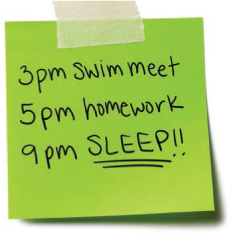
• Pencil it in: you have schedules for classes, sports, work, and your social life, why not pencil in sleep and nap time? Become a master planner!
• Stay active when the sun’s up: if you use up all of your energy during the day, your body will likely accept sleep at night.
• Keep an empty tank: avoid eating within two hours of bedtime, and certainly stay away from caffeine drinks for at least eight hours before bedtime. (Yup—the effects can last that long or even longer!) Bonus: an empty stomach at bedtime translates into better fat burning while you sleep! Who’s going to argue with that?
• Create a dreamy cave: if your bedroom is a cluttered mess, too warm, and full of light (perhaps from a street light or city lights shining in through curtains or blinds), it’s time for a massive makeover!
• Don’t overthink it: if you often have a hard time falling asleep at night, just the act of worrying about falling asleep can keep you awake. If you find yourself wide-eyed after 15 or 20 minutes of lying down, try reading a book, making a list of the thoughts racing through your mind (hey, if they’re on paper they don’t need to be in your head), or doing something else low-key until your body signals it’s ready for sleep. Sorry—videogames, TV, and social media are not considered low-key activities.
Let’s face it, when your brain is tired, you will fall asleep (or at least zone out) no matter what you’re doing. So the next time you feel like you have to stay up late and study for an important test, realize that you’re better off giving your brain some rest. Your late night study session and lack of good night’s sleep will cause your brain to totally space out instead of focusing when the test is in front of you.
No really, never stop playing. It’s awesome. I understand it’s easy to feel like you’re getting too old to play because you’re too busy with school, sports, or just “trying to be cool,” but play really is one of the easiest ways to stay fit, strong, and happy. Maybe you just don’t like the word “play” because it sounds like something a baby does? Okay, let me rename it for you—let’s call it “adventure.”
Partaking in super sophisticated teen adventures is a great thing to do now (and until you’re old and gray) because play—oops, I mean adventure—will help your mind and body in many ways, including:
The most excellent part of playing (eh, just deal with it, I’m calling it playing!) is that there are no rules. When you were a child, no one dumped a bunch of rules on you, blew whistles in your face, or criticized your technique when you were playing, and it won’t happen now either. Play is all about following your heart, your creativity, and your desire to be active. You’ll know you’re doing it right when you find yourself completely lost in the moment.
The same goes for our ancestors. Even though Grokette had a really difficult life full of hard work, anthropologists are certain that she played regularly. Our ancestors realized that they needed ways to unwind and de-stress from the grind and the danger of daily life. They engaged in all kinds of play that served as entertainment and a way to strengthen social bonding and learn new skills. If you watch puppies in action, or even wild animals like wolves or lions, you’ll see young cubs roughhousing with each other all day long. Of course, they aren’t trying to hurt their siblings; they are actually honing their hunting skills for when it’s time to move from play to reality!
The beauty of play, unlike sports or other organized activities, is that there are no strict guidelines and no demands on your time. Here are some of my favorite ways to play and get the most out of life:
• Walking my dogs: there are few things I love more than my two Boston Terriers (they’re actually laying at my feet as I type these words). They fill my life with so much joy and I like to return the favor by taking them for walks every evening. (They love walks.) I even incorporate my weekly sprint sessions into these dog walks because it’s exciting for them and it’s just way more fun to run with a partner or two…even if those partners are furry and run with their tongues out!
• Monkeying around: I live close to the famous Muscle Beach in Venice, California, and it’s one of my favorite spots to play. I really love doing flips or hanging upside down on the parallel bars, soaring through the air on the giant swing sets, and flying around like a monkey on the rings. It’s a killer workout, but I barely realize it because I’m having way too much fun to even notice!
• Mountain climber: because of where I live, I’m also lucky enough to be within driving distance to some really incredible mountain trails. One of my favorite sites to climb is Stony Point in the San Fernando Valley. The landscape is a blend of hiking paths and rock climbing spots. It’s a great chance to explore, use problem-solving to navigate tricky terrain, and experience a breathtaking view when you reach the top! Talk about some serious payoff.
• Dolphin taxi: at this point you’ve probably gathered that I like to take advantage of the incredible environment I live in. While I do live very close to the beach, I’m kind of a wimp and think the water of the Pacific Ocean is too cold (even in the summer months). I do, however, love playing in the ocean. Last year I spent a couple weeks in Playa Del Carmen, Mexico where the water is crystal clear and super warm. I could spend my entire day jumping and swimming in those waves. It’s a great workout and boy, does it keep you alert. Timing waves with jumps and dives, or hoping on a friend’s back is serious business. It takes a lot of planning, problem solving, and agility!
And these are just the things I like to do to take advantage of the beautiful state that I live in. You don’t need to live next to the ocean or near any mountains to go on your own adventure. Explore the place you’re from and see what kinds of exciting journeys you can find.
By nature, you were meant to spend a lot of time in the sun. Our planet clearly did not come equipped with houses, skyscrapers, or shopping centers, which means our ancestors spent the majority of their time in the great outdoors. Sure, they built primitive homes or took refuge in caves (insert cheesy caveman joke here) when they had access to them, but they were very comfortable with being outside, and actually thrived in their environments.
Spending some quality time in the sun not only improves your mood and gives your skin some healthy color, but it also supplies your body with a good dose of vitamin D. This awesome vitamin (it’s technically a hormone, but everyone calls it a “vitamin”) has recently been referred to as the new “wonder vitamin” as experts continue to learn about its role in healthy lifestyles and disease prevention. Vitamin D is essential for:
Sadly most people, including teenagers, don’t get enough vitamin D. We tend to spend too much time indoors and lack proper nutrition through diet alone. So how much sun should you get? Depending on your complexion, anywhere between 10 and 30 minutes every day should be enough to get a good dose. You need to expose large skin surface areas of your body to the sun. Since your face typically gets more exposure than any other part of your body (and is also the most sensitive skin), give it a break by wearing a hat and sunglasses or sitting in partial shade and exposing as many other parts of your body to the sun as you can.
Of course, like everything else, moderation is key. If you’re lathering up with oil and spending hours in the sun, you could be absorbing too many harmful UVA and UVB rays. These harmful rays can sometimes cause melanoma, which is a type of skin cancer. If you’ve ever had sunburn, it means you got too much sun. The best guideline is to never burn, but to try and maintain a slight tan during the months of the year when the sun shines the brightest. If you choose to protect your skin with sunscreen, avoid products that contain oxybenzone—a chemical that’s been shown to “disrupt hormonal function.” Creepy! Instead, try covering up with protective clothing or use all-natural sunblocks that feature zinc oxide (the safest and most effective UV-filter) as the active ingredient.
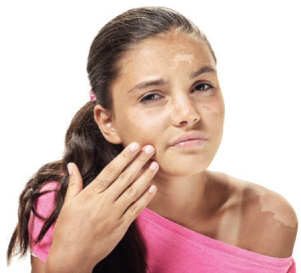
In addition to sunshine, you can also get vitamin D from foods like eggs, fatty fish, and fish oils such as salmon, mackerel, and cod liver oil. All of these foods are 100 percent paleo and you’ve probably already been working them into your diet, haven’t you? Oh, I’m so proud!
That may be common sense…or is it? Our ancestors were smart, and they had to be—it meant the difference between life and death! This modern world entails far fewer risks than those that faced our ancestors 10,000 years ago, but our lapses in judgement make us more susceptible to dangerous accidents. The truth is, the margin of error was much smaller back then. Think about it—but don’t hurt yourself!
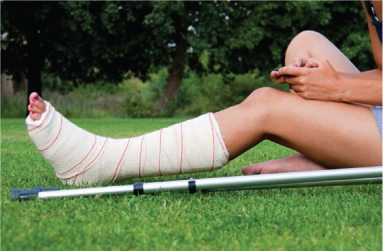
Let’s consider a worst-case scenario, here. Imagine you fell while hiking in the woods and broke your leg. Whoops. That’s going to suck no matter what time period you live in—but let’s examine the aftermath.
• Wham! Yup, that’s broken. Your BFF grabs her cell and calls 911 (that is after posting a picture of you screaming in pain online, of course…57 likes!)
• Paramedics arrive in minutes, put you in the ambulance, and speed you off to the hospital.
• X-ray shows you really did a number on that tibia (your shinbone).
• The doctor sets your broken bone, puts your leg in a cast, and tells you to stay off it for three months while it heals.
• During that time, you hang out in bed, watch TV, sleep A LOT, socialize with your friends online, get spoiled by Mom, and pretty much live like a queen.
• Three months later, the Doc is pleased with how much you’ve healed and takes the cast off.
• You impress everyone at school with your dramatic story of how you almost died a few months ago, but you’re pretty sure you have super hero powers that saved you.
Now let’s take a look at how this chain of events would have played out if you made a mistake like this 10,000 years ago…
• Wham! Yup, that’s broken. Your BFF runs five miles back to the tribe to get help.
• After two agonizing hours alone, your friend, along with some adults, arrives to carry you back to the village. Boy is that a bumpy and painful trek home.
• No one can tell exactly what’s wrong or if it’s actually broken; all of the injuries are internal.
• Dad wraps some hide around your leg and hopes you feel better soon.
• In that time you are lying on the ground in the shade, in A LOT of pain, your Mom has to spend more time gathering food since you can’t help her, causing her to become overworked, and you pretty much hate life.
• A mountain lion comes into your village.
• He eats you for dinner.

I bet you didn’t see that plot twist coming! Okay, I know that’s kind of a silly story, but the moral is this: your constant protection from danger often desensitizes you from its real existence. Let me explain further. Today, a lot of people have a very reckless sense of invincibility. Teens especially think that nothing can hurt them and that if there is ever a problem, someone or something can save them. In this scenario, the doctors used medical technology to fix your leg and your parents used the conveniences of modern life to keep you safe and comfortable.
Before technology and the conveniences of the modern world, teens had to be savvy. They knew that they weren’t untouchable, so they stayed sharp, thought critically, and used a lot of common sense to stay out of trouble.
You don’t have to worry about mountain lions anytime soon, and that’s great, but let’s consider the top three causes of teen deaths today.
Umm, hello…that’s pretty messed up! We’ve worked so hard for thousands of years to progress our society. To become smarter, safer, and more secure, and yet today we still make stupid mistakes that lead to the same sad ending as getting eaten by a mountain lion. So let’s be smart. Let’s be safe, love each other, and love ourselves.
With this understanding, how can you be a savvy Primal teen in this modern world? You could simply start by doing things that stimulate your brain. Your ancestors learned a lot about problem solving, interacting, critical thinking, creativity, and common sense through the actions of their everyday lives. Your generation is bombarded with sensory overload, causing you to think less, become restless, underutilized, and unfulfilled.

You could consider using technology to your advantage. Instead of spending hours online mindlessly interacting with pseudo-friends, watching stupid videos, and looking at pictures of cats, you could use that time to learn something. Or better yet, what if you turned your computer off and read a book? (Oh look, you’re already doing that—good for you!) Or spent time with your family? Or established a new hobby? The more you enrich your brain with new information, explore different thoughts and feelings, and experience all the world has to offer, the more amazing and dynamic you will become.
Let’s take a minute now to peer into your future. When you picture yourself 10, 20, or even 30 years from now, what do you see? Are you lean, healthy, and full of energy? Or are you overweight, out of shape, and on a lot of medication? If you’re anything like me, you want the healthy future.
Did you know that the way you eat and how active you are in your teens determines the type of adult you become? Don’t put your health off! The longer you stay on a path of junk food and inactivity, the longer it will take to break those bad habits and reverse the damage you’ve done. Ask any adult you know; I promise they’ll tell you to start early…and they say this from experience!
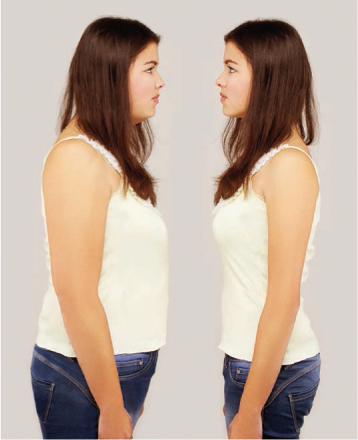
Unhealthy adults who decide to fight back and take the fate of their health into their own hands can spend months, or even years, trying to reclaim the weight loss, health, and energy they experienced in their teens. If you follow the advice in this book, you won’t have to waste all that time working your butt off (literally) to get back something you already have! Even if you’re a little overweight as a teen, it’s so much easier to get your lifestyle in control now before you become accustomed to unhealthy choices that may just stick with you when you’re an adult.
In addition to setting yourself up for a healthy future, you’re also allowing yourself to function at optimal health now. This will keep you sharper in class, quicker on the court, and happier in your social life.
The average teen requires between eight and a half and nine hours of sleep each night, but most only get around six or seven hours. A lot of this has to do with post-daylight exposure, causing a shift in your circadian rhythm, or internal alarm clock. There are some tricks you can implement, like taking a bath before bed, which can sometimes help you get a good night’s sleep.
Playing is good for you because it enhances your creativity, gives you a sense of freedom and independence, and relieves stress, just to name a few of the benefits. You should never stop playing, because play just might be the true fountain of youth!
Between 10 and 30 minutes of sun every day can help you get the adequate amount of vitamin D your body requires. Too much sun can expose you to unhealthy levels of UVA and UVB rays that can cause melanoma, which is a type of skin cancer. If you must be in the sun for prolonged periods, consider covering up with protective clothing or use all-natural sunblocks that feature zinc oxide as the active ingredient. Avoid suncreens that use oxybenzone.
The conveniences of the modern world may have made your bright and sharp mind dull and unchallenged. Don’t fall victim to mind-numbing over stimulus of your everyday life, and instead fight back and become someone extraordinary. Expand your horizons and always push to better your mind, body, and spirit.
Starting on your Primal journey now at such a young age will not only help you become a healthy adult, but will also make you one heck of a teen. With optimal health, you will look and feel better than your peers who aren’t looking out for their best interests. Put your health first and you’ll reap the benefits for the rest of your life!